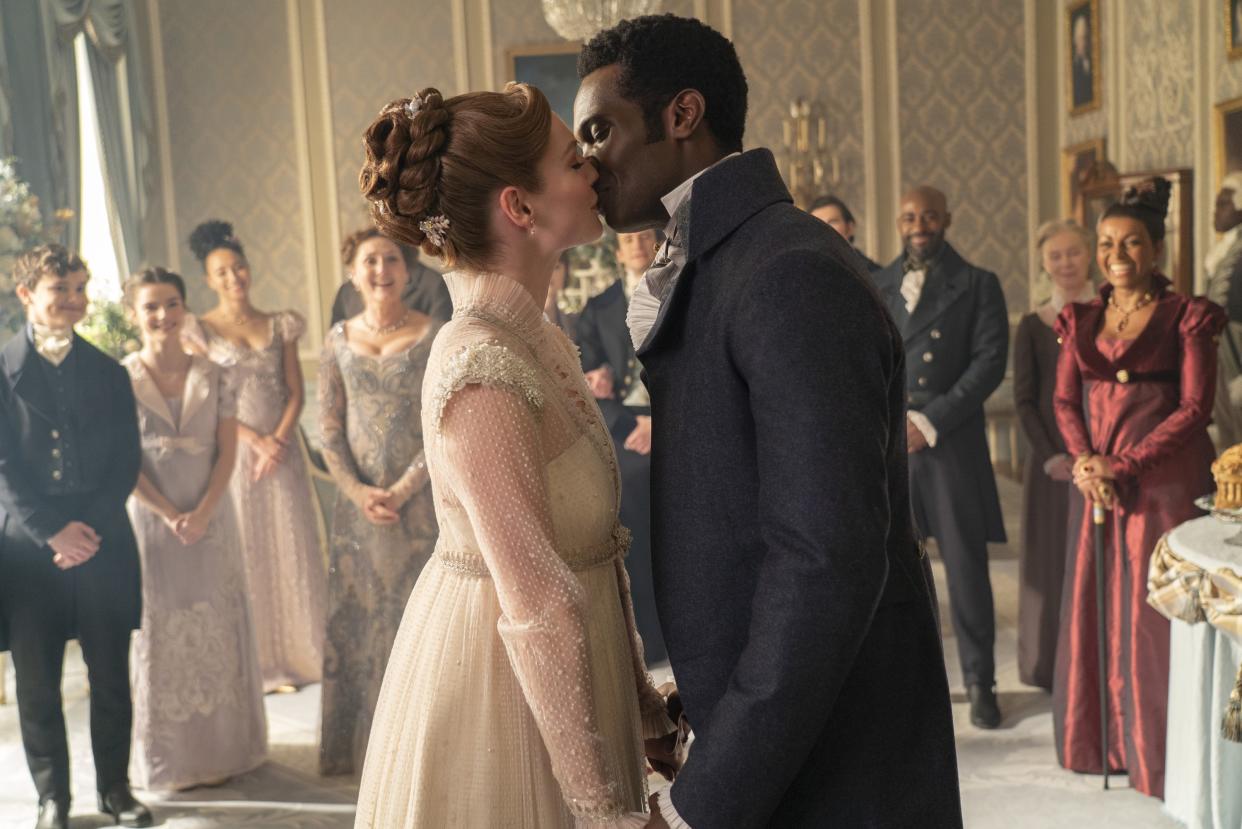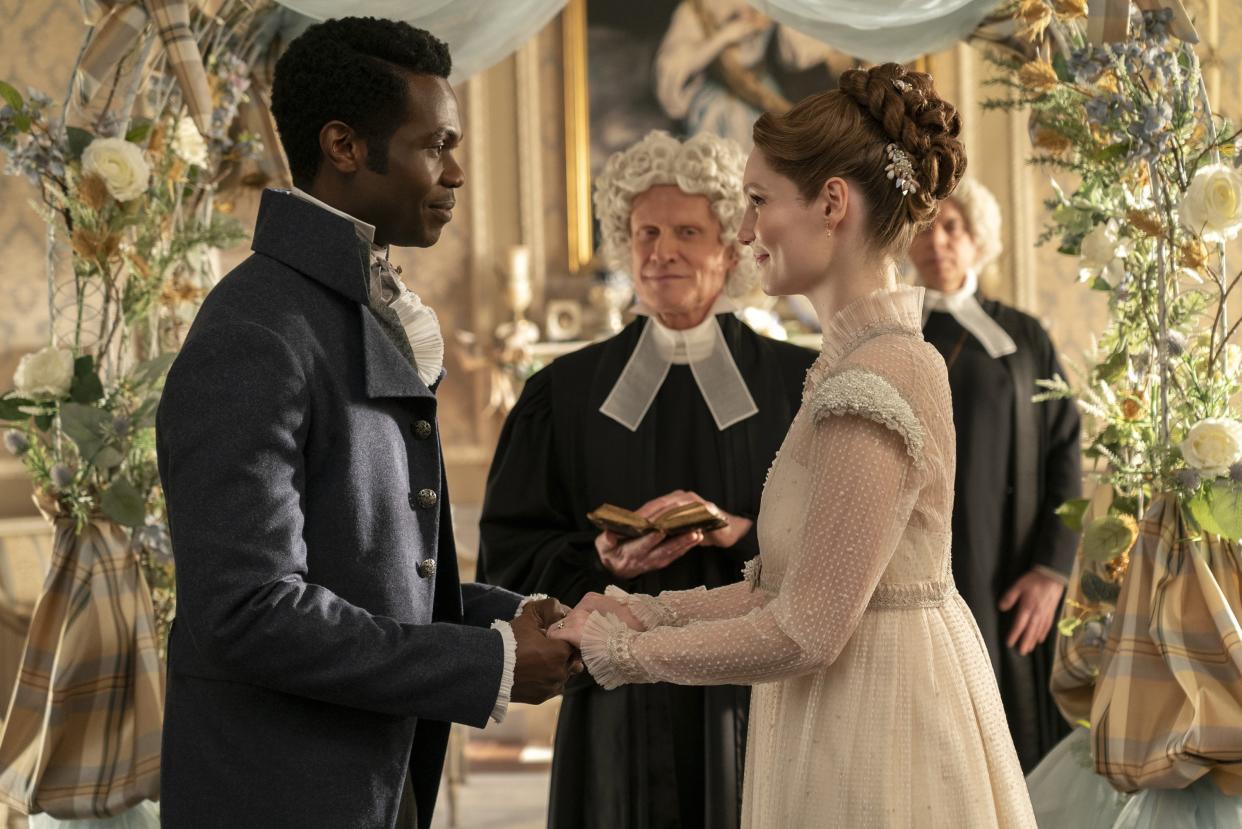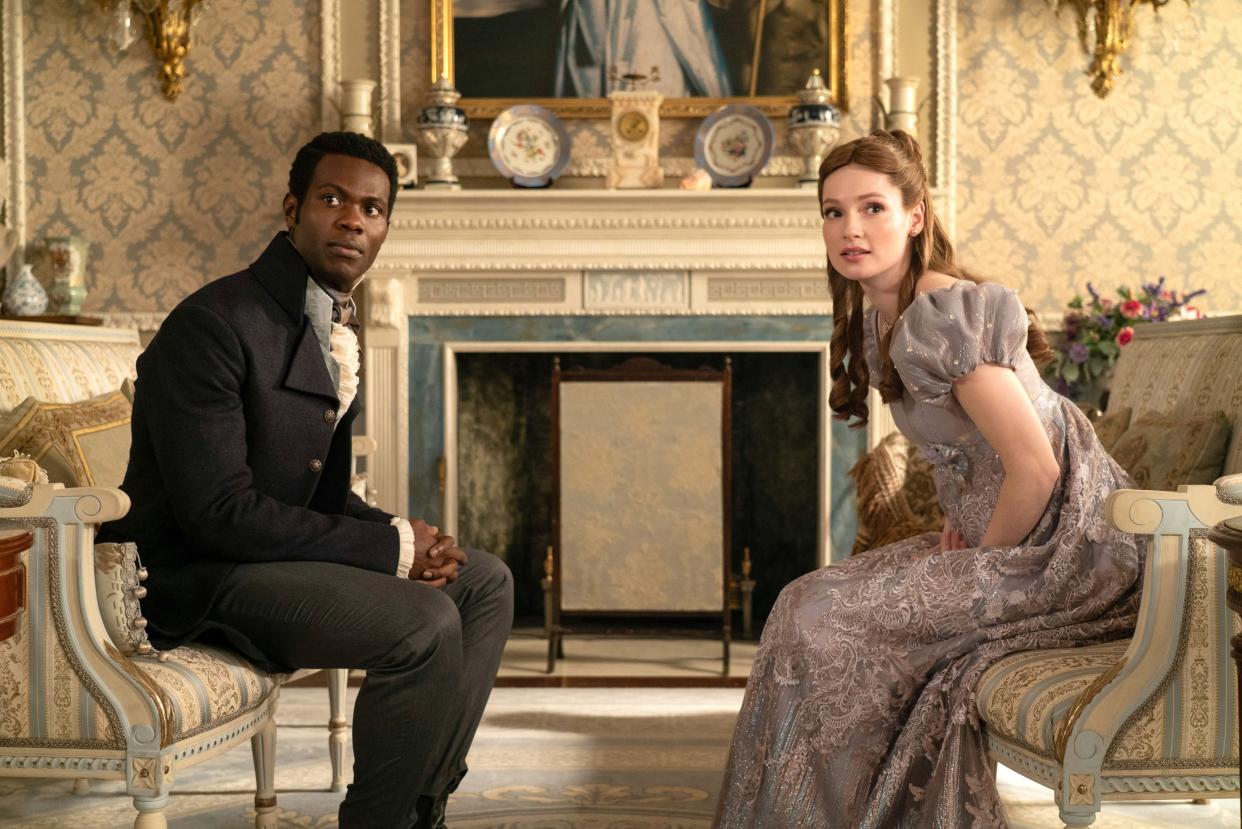'Bridgerton' author Julia Quinn defends twist in Season 3. Devoted fans still aren't satisfied.

This article contains details about Season 3, Part 2 of Bridgerton.
Julia Quinn, author of the Bridgerton book series upon which the hit Netflix series is based, recently addressed a plot change revealed in Season 3’s finale — but her statement has done little to quiet upset fans.
In the statement, posted to Instagram on June 25, Quinn stood by showrunner Jess Brownell regarding the decision to steer Francesca Bridgerton into a queer storyline by gender-swapping the popular character Michael Stirling.
While this isn’t the first time an author has spoken out about the differences between their source material and its screen adaptation, it’s a rare instance of an author defending such a departure — especially in opposition to their devoted fanbase.

Why are fans upset?
In the book When He Was Wicked, Francesca Bridgerton is deeply in love with her husband, John, and is devastated when he tragically dies of a brain aneurysm. Years later, she falls in love with and marries his cousin, Michael Stirling.
In the Netflix adaptation, not long after her nuptials (and a seemingly disappointing kiss at the altar), Francesa seems to fall in love at first sight with John’s now-female cousin, Michaela.
According to disappointed fans, this change undermines the depth of Francesca and John’s relationship, while also erasing a major plotline about infertility, miscarriage and birth after child loss.
Hardcore fans of the book were so upset by the change, they created a petition pleading with showrunners to “honor the original spirit of the Bridgerton books, and restore Michael Stirling to his rightful place in Francesca's story.”
This isn’t the first fan community to feel disappointed about how their favorite books are brought to life.
Michael Bronski, professor of the practice in media and activism/studies of women, gender and sexuality at Harvard University, says fans might form intense attachments to works of fiction because of Freud’s “pleasure principle.”
“We all watch films/TV or read books because they give us pleasure, and most of us lead lives where we feel we may not get enough pleasure,” Bronski told Yahoo Entertainment via email.
“So if this emotional connection viewers/readers derive makes them feel emotionally satisfied/rewarded in ways [that] they do not usually experience in their everyday life, they are going to be very attached to the pleasure giving object,” he wrote.
According to Bronski, who is also the author of A Queer History of the United States, changing any aspect of this relationship — a plot twist, a change in character, a new ending — results in an emotional experience for viewers who are deeply attached to the original material.
“If heterosexual viewers watching Bridgerton are emotionally involved in the plot and have romantic (and probably sexual) fantasies about these characters, they may well feel completely betrayed by a gender switch. The writers of the show have, in some profound way, betrayed their highly pleasurable romantic and sexual fantasies,” said Bronski.
“Of course, queer viewers may find this delightful and wonderful,” he added. “Especially as queer relationships, while increasingly common, are still rare in TV shows and films.”

'I am touched by your deep commitment to the characters of the "Bridgerton" world'
In her Instagram post, Quinn stood by the plot change and asked fans to grant her and the team from production company Shondaland “some faith.”
According to Quinn, Michael’s gender swap came after much discussion between her and Brownell. “I needed more information before conferring my agreement,” she wrote.
Still, fans were unmoved by Quinn’s words.
“This is beyond disappointment. I'm queer and I like that they want to give the LGBTQ+ community representation BUT they should create new characters to give them that storyline, NOT CHANGE a major character that is loved by everyone in the fandom,” one fan wrote in the comments.
“You took away a heartfelt story of infertility, miscarriage, heartbreak, and miracle babies that we all love and needed more recognition of,” another fan commented.
Brownell, in an interview with Teen Vogue, explained how Michaela came to be. “The first time I read Francesca's book, I really identified with it as a queer woman. … [Quinn’s] book is very much about [Francesca] feeling different, and not really knowing why. In the book, I think it has a lot to do with her just being an introvert, but as a queer woman, a lot of my queer experience, and I think a lot of my friends’ [experiences have] been about that sense of feeling different, and navigating what that means.”
As to how fans might feel about the change, Brownell said, “The fan base is not a monolith, and you're never going to please every single side of the fan base.”
Sohinee Roy, an English professor at North Central College in Illinois who previously taught a course on race relations, representation of racial status and gender roles within the Bridgerton series, said adaptations represent more than just their source material.
“An adaptation is never a replica of the original text. It is the adapter’s interpretation of the original text,” Roy told Yahoo Entertainment. “It always reflects not just the adapter’s ideologies, but the historical context within which the adaptation is taking place.”
Additionally, Roy noted, Michael’s gender swap is just one of many departures from the series’ source material.
“Bridgerton the show is very different from the books. The Colin-Penelope story unfolds very differently from that in the books. Eloise does not discover Penelope’s identity. Queen Charlotte does not feature in any of the novels. I could go on about the myriad ways the series differs from Quinn’s novels. So it is interesting what departures cause fans most consternation.”

'Adaptations are always a tricky thing'
While it’s not the first time an adaptation has taken artistic liberties with its source material, Quinn’s statement is a rare instance of an author defending such a departure.
Robinne Lee, author of The Idea of You, now a Prime Video adaptation starring Anne Hathaway, shared the shock she felt when discovering filmmakers had given her story a Hollywood happy ending — one they didn’t clear with her first.
“Adaptations are always a tricky thing because books are so much more cerebral, and you're reading the character's thoughts, and it's hard to convey character's thoughts in a film, so there's going to be changes,” Lee toldEntertainment Weekly.
“Hollywood's going to do what they're going to do. … You hope they'll keep to what you've written because it meant something to you, but you also have to think about the box office and viewers and what their audience is going to want to see.”
George R.R. Martin, writer of the Game of Thrones series, is another author whose novels differed greatly from their onscreen adaptations — and not always to his liking.
“Everywhere you look, there are more screenwriters and producers eager to take great stories and ‘make them their own,’” he wrote in a May entry on his blog, Not a Blog.
“No matter how major a writer it is, no matter how great the book, there always seems to be someone on hand who thinks he can do better, eager to take the story and ‘improve’ on it. … They never make it better, though. Nine hundred ninety-nine times out of a thousand, they make it worse.”
As for Quinn, the author wrote in her Instagram post that while there will be two versions, each one will have its own merits.
"I think we are going to end up two stories, one on page, and one on screen," she wrote, "and they will both be beautiful and moving."
